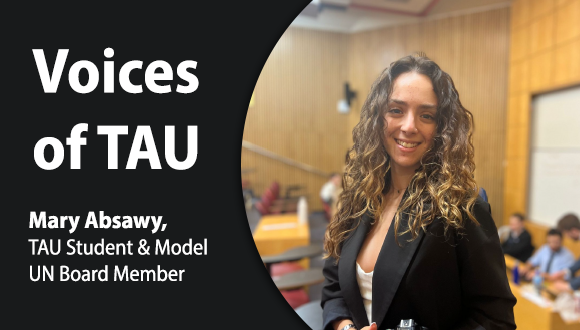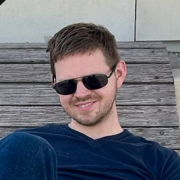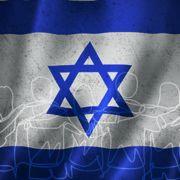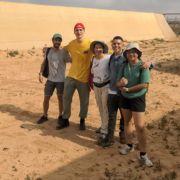Voices of TAU: "All University Teams Have Shown Solidarity And Support for the Students"
Arab-Israeli Communications & Media Studies major describes her life, emotions, and coping strategies
The Lowy International Bulletin has talked to Mary Absawy, an Arab-Israeli student at TAU who is completing a bachelor's dual degree in Communications & Media Studies, as well as in Arts. She is also a TAUMUN board member.
How have you been coping since October 7th?
Coping with the ongoing conflict as an Arab Israeli can be a complex and challenging experience. This unique position encompasses both the Arab and Israeli experience — the duality can be a source of strength, but also a curse. Having to constantly fight this identity crisis is very hard, especially during difficult times like this.
Arab Israelis may feel caught in the middle of the broader Israeli-Palestinian conflict. They may face scrutiny and suspicion from both sides, which can be emotionally and psychologically taxing. I am fully aware that I am living in a country affected by conflict; that’s why I always remember to seek emotional support.
I reach out to my friends and family or to support communities formed on social media to discuss my feelings and concerns, which provides comfort and understanding because we are all going through similar challenges.
The last and most important thing I do is that, while I stay informed, I limit my social media usage; discourses and shared content on social media can be a source of stress so I reduce my exposure to contentious negative content, graphic or distressing images that may increase anxiety, and I consume my safety information about the situation through reliable and unbiased news sources, which is obviously not social media these days….
What has your experience been, as both an Arab Israeli and a TAU student?
As we all know, universities are disrupted due to the security challenges and this disruption directly impacts the educational pursuits of us students and delays our academic progress.
Genuinely speaking, I am thankful to my younger self for choosing to study at Tel Aviv University.
I think that you get to appreciate the university you are studying at, and you get to experience its actual value, during difficult times like this. All academic and director teams have shown solidarity and extensive support for their students, taking into consideration the Arabs among them. Having academic support, knowing that you have something to lean on during these uncertain times, provides a sense of certainty and serenity.
How would you describe your life right now as an Arab Israeli?
This is a complex scenario. I am mostly feeling helpless. As an Arab Israeli, I feel that I have little control over the situation, which leads me to frustration and hopelessness. It is mostly looking at the situation from a side-view perspective, but I cannot touch it or do anything about it. I want to share my thoughts, I want to speak up for humanity, I want to speak up for the people, but I can’t.
Going to work or university, shopping, and even simple tasks like visiting friends or family would become more challenging or impossible. I might be targeted by extremists living around me just for being an Arab in light of the ongoing conflict, although I am Israeli. This makes me live with a pervasive sense of anxiety.
The unpredictability of war, including air raids, missile attacks, and the general instability, is just exhausting, knowing that I can also fall in an attack by Arabs from the other side.
Let’s not forget the constant concern for the well-being of my family members on the one hand with every siren going off, and on the other hand, my Jewish Israeli friends who are currently serving in the military and can be gone in a blink of an eye. It's just this duality that is taking a toll on my mental health.
With so much attention on this region of the world right now, is there something you feel that the media reporting is missing?
I personally think that uplifting and comforting content is missing. International media is focused on the broader political and military aspects of the conflict, but the everyday experiences and perspectives of local people, including civilians living in the affected areas, can be underrepresented.
Showcasing these lost and often forgotten perspectives can provide some sense of relief to other people; it proves that everyone is going through difficulties, and nobody is alone or different — we are all humans at the end of the day.
May I also remind everyone that people in general should refrain from consuming war information on social media, and should go back to regular "trusted" media during these times because it seems more reliable.





